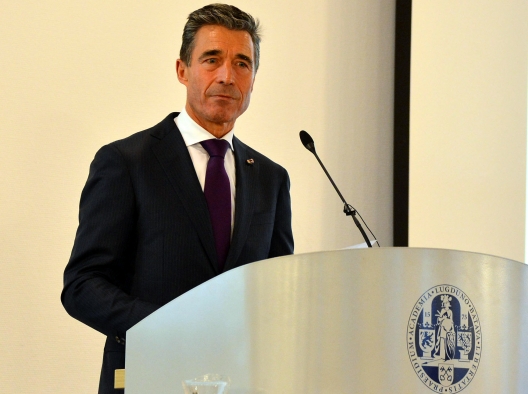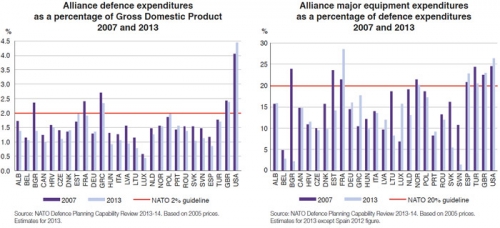 Between 2008 and 2013, total defence spending by European NATO Allies declined by almost 40 billion US dollars in nominal terms.
Between 2008 and 2013, total defence spending by European NATO Allies declined by almost 40 billion US dollars in nominal terms.
To give you a better idea of the size of this drop, it is equivalent to what the Netherlands, Norway, Poland and Spain together spent on defence last year. Some European Allies have seen reductions of up to 40%. And with a drop of just over 15%, the Netherlands has also cut by more than the NATO European average. . . .
Generally, Europeans tend to value NATO membership as a way to improve the effectiveness of their militaries. But North Americans increasingly believe that NATO doesn’t offer much for their security. They think that they do too much, and the Europeans too little.
So, in light of these findings, how can we make a better case for defence in general, and for NATO in particular?
First, it is important to understand the basic purpose of our defence: to protect our peoples and our principles. Freedom. Democracy. Human rights. And the rule of law. These values are vital to our continued peace and prosperity. But they are not a given. We must all be prepared to stand up for these values.
That argument should carry particular weight here in the Netherlands. For many years, your country has been one of the strongest advocates of a stable, rules- and values-based international order. This city, The Hague, has developed into the global capital of international law and human rights. But sometimes those rights and values cannot be defended with legal instruments alone. Sometimes, we must fight to protect them.
Second, any balanced debate about defence must take into account the price of having no defence. Because in our fast-changing world, where challenges are complex and interconnected, crisis and conflict come at a cost.
There is a considerable human cost. According to the United Nations High Commissioner for Refugees, there are now more than 45 million forcibly displaced people.
Nearly half of all refugees are children. On our own doorstep, in Syria, the conflict has caused more than 2 million people to leave their homes and seek refuge over the border.
And then there is the financial cost. According to the World Bank and the Economist Intelligence Unit, the Balkan wars of the 1990s cost the international community more than 160 billion US dollars. And in the decade following the 9/11 terrorist attacks, the US spent a total of 360 billion US dollars on homeland security.
Two years ago, your national research agency TNO estimated that cybercrime costs Dutch society at least 10 billion Euros per year, or between 1.5 and 2 per cent of your Gross Domestic Product. But TNO also said there were strong indications the cost could be as much as two to three times higher.
Last year, the World Bank estimated that the annual global impact of Somali piracy is 18 billion US dollars. Rotterdam is Europe’s biggest port. Half of its container traffic is with Asia. And Dutch shipping companies now spend up to 150.000 Euros in extra costs for fuel and insurance for every passage through the Gulf of Aden.
And let’s not forget. Investment in defence is also an investment in one of the world’s most innovative, highly-skilled and highly-productive industries. Here in the Netherlands, that industry employs some 15.000 people. And it has an annual turnover of some 3 billion Euros.
Now, don’t get me wrong. We should not invest in defence just to create jobs. We need defence to protect our populations and our principles. But once we have a defence sector, we need to understand that there are significant benefits, including innovation and technological progress.
Third, it is important to understand the value of defence as a tool for international influence and cooperation. And that is particularly relevant for countries like yours and mine. Countries which are perhaps not the greatest in size. But which are outwards looking and globally connected.
We all believe diplomacy to be the primary tool for dealing with international security challenges. But by investing in defence we can back our words up with military strength.
I believe that developments in Syria last year hold an important lesson. Without the credible threat of military force, Syria would not have agreed to the destruction of its stock of chemical weapons.
The Organisation for the Prohibition of Chemical Weapons, with its Headquarters here in The Hague, would not have been able to undertake the important work it is doing at the moment. And the warring parties would not be sitting around the negotiating table in Geneva.
These are all important reasons why defence matters to individual nations and to your country in particular. And they are important reasons why NATO matters too.
Excerpts from speech by NATO Secretary General Anders Fogh Rasmussen at the Faculty Campus The Hague of Leiden University, January, 30, 2014.

Image: NATO Secretary General Anders Fogh Rasmussen (photo & graphic: NATO)
